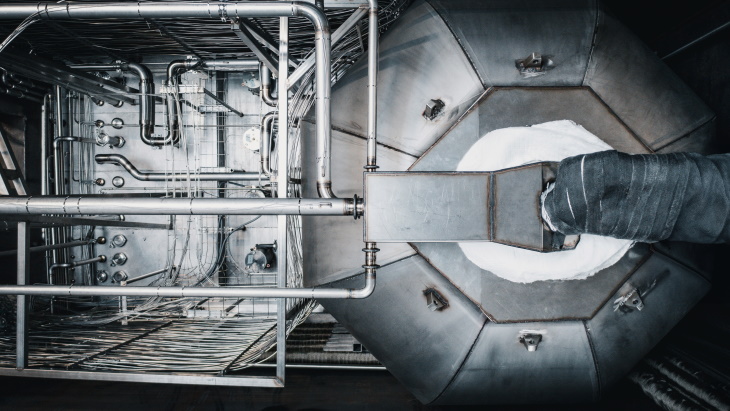
Molten salt reactors (MSRs) use molten fluoride salts as primary coolant, at low pressure. They may operate with epithermal or fast neutron spectrums, and with a variety of fuels. Much of the interest today in reviving the MSR concept relates to using thorium (to breed fissile uranium-233), where an initial source of fissile material such as plutonium-239 needs to be provided. There are a number of different MSR design concepts, and a number of interesting challenges in the commercialisation of many, especially with thorium.
Copenhagen Atomics is developing a containerised molten salt reactor. Moderated with unpressurised heavy water, the reactor consumes nuclear waste while breeding new fuel from thorium. Small enough to allow for mass manufacturing and assembly line production, the reactor has an output of 100 MWt.
Through its collaboration with PSI, a critical experiment will be carried out using Copenhagen's thorium-fed 'Onion Core' reactor design at PSI's facilities. The experiment is scheduled for 2026-27.
The purpose of this experiment is to validate the technology and provide valuable experience for the collaboration partners in the design, construction, licensing, operation and decommissioning of the new molten salt reactor technology, as well as to collect data for commercial deployment, and with open source data for validation of reactor modelling tools.
The collaboration agreement runs initially for four years.
"We're very excited to work on advancing molten salt reactor technology together with PSI, who come with world-class expertise, experience, and facilities to conduct large-scale nuclear experimental work," said Aslak Stubsgaard, CTO of Copenhagen Atomics.
Marco Streit, Head of PSI Hot Laboratory, added: "Personally, I am very glad that Copenhagen Atomics has decided to work with PSI as a collaboration partner to prove the feasibility of their vision here at our institute."
Copenhagen Atomics said it is already producing and testing full-scale test reactor prototypes at its headquarters in Copenhagen along with dozens of smaller-scale loop tests and salt production. The company's molten salt reactors use lithium, thorium and low-enriched uranium fluoride salt as the reactor fuel and can be factory manufactured in modules the size of a 40ft shipping container, with the long-term goal of making commercial thorium molten salt breeder reactors, with a levelised cost of electricity price of USD20 per MWh.
In May last year, a collaboration between Danish and Indonesian companies announced thet were to study the operational and regulatory conditions for constructing an ammonia production facility in Indonesia powered by Copenhagen Atomics' small and modular thorium molten salt reactors. The nuclear power plant part of the project will comprise of 25 SMR modules providing a total of 1 GW.
A few months earlier, UK Atomics - a subsidiary of Copenhagen Atomics - submitted a Generic Design Assessment (GDA) entry application for its containerised molten salt reactor to the UK Department for Business, Energy and Industrial Strategy. GDA is a process carried out by the Office for Nuclear Regulation and the Environment Agency to assess the safety, security, and environmental protection aspects of a nuclear power plant design that is intended to be deployed in Great Britain.
According to Copenhagen Atomics, the reactors will be deployed by UK Atomics, who will build, own and operate a fleet of autonomous reactors, "eventually numbering in thousands". This business model, selling energy-as-a-service, will enable a cost-effective and low-risk deployment, it said.
The first commercial reactor is scheduled to begin operating in 2028.